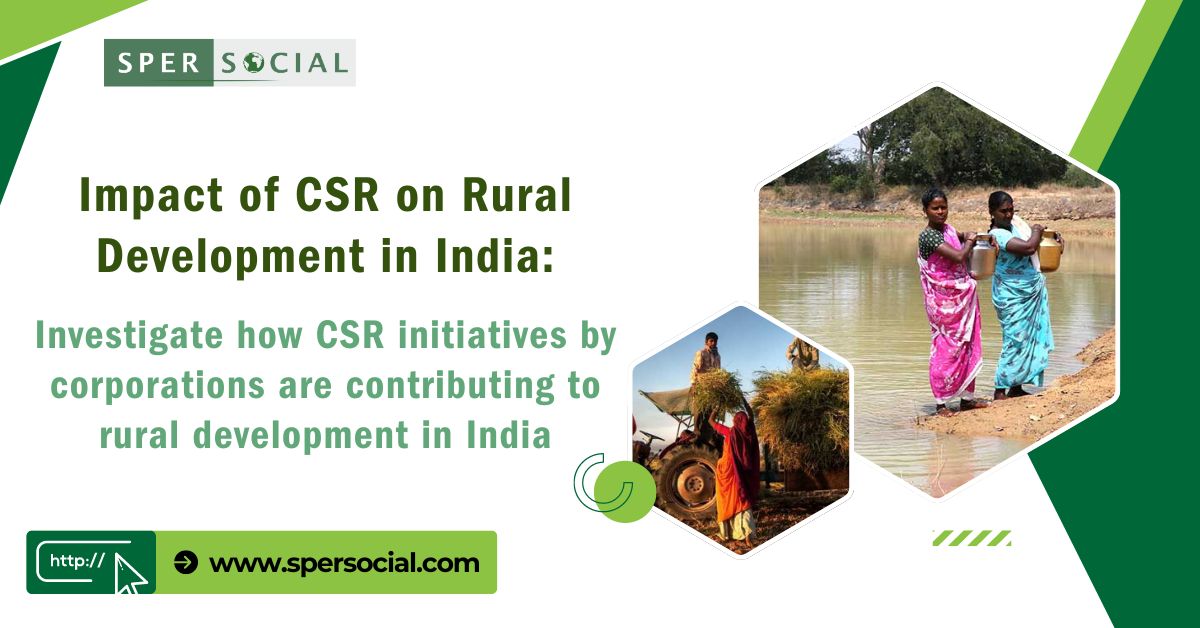
Corporate Social Responsibility (CSR) has become a pivotal element in driving sustainable development in India, especially in rural areas where most of the population resides. Through CSR, companies have the opportunity to contribute to the socio-economic development of these regions, addressing critical issues such as education, healthcare, sanitation, and infrastructure. The impact of these initiatives has been profound, as they not only uplift rural communities but also align with the broader goals of nation-building.
The Role of CSR in Rural Development:
Rural areas in India often face significant challenges such as poverty, lack of basic amenities, limited access to quality education, and inadequate healthcare services. These issues are compounded by a lack of infrastructure and employment opportunities, making it difficult for rural communities to improve their living standards. CSR initiatives by corporations have the potential to address these challenges by bringing resources, expertise, and sustainable solutions to these underserved areas.
Education and Skill Development:
One of the key areas where CSR has made a substantial impact is education. Companies like Tata Steel and Infosys have implemented educational programs aimed at improving literacy rates and providing vocational training to rural youth. For example, Tata Steel’s "Thousand Schools Project" in Odisha and Jharkhand has transformed educational facilities in rural areas, benefiting over 100,000 students by improving infrastructure, providing learning materials, and training teachers.
Similarly, Infosys Foundation’s partnership with various NGOs has led to the establishment of libraries and computer centers in rural schools, enabling students to acquire digital skills, which are increasingly important in today's economy.
Healthcare Initiatives:
Healthcare is another critical area where CSR initiatives have brought significant improvements. Many rural areas lack access to basic healthcare facilities, leading to high infant mortality rates and preventable diseases. Companies like Reliance Industries and Wipro have stepped in to bridge this gap. Reliance's "Project Drishti," for instance, has provided free cataract surgeries to underprivileged patients in rural areas, restoring sight to over 500,000 individuals.
Wipro’s healthcare initiatives include mobile medical units that travel to remote villages, offering free medical check-ups, medicines, and health awareness programs. These initiatives have not only improved the health of rural populations but have also reduced the burden on government healthcare systems.
Infrastructure Development:
Infrastructure development is essential for the overall development of rural areas. Adequate infrastructure enables access to markets, healthcare, and education, all of which are crucial for economic growth. CSR initiatives by companies like Mahindra & Mahindra have focused on building roads, providing clean drinking water, and constructing sanitation facilities in rural communities. Mahindra's "Nanhi Kali" project, which focuses on girl child education, also includes the development of school infrastructure, ensuring that students have a conducive learning environment.
Environmental Sustainability:
Sustainable development is a core principle of many CSR initiatives in rural India. Companies like ITC Limited have implemented watershed management programs that help conserve water in drought-prone areas. ITC’s "Mission Sunehra Kal" focuses on creating sustainable livelihoods by promoting water conservation, afforestation, and agricultural productivity in rural regions. This initiative has positively impacted over 4 million people across 35,000 villages.
Hindustan Unilever’s "Prabhat" initiative also emphasizes sustainable development through water conservation, sanitation, and livelihood enhancement programs. These initiatives are crucial in ensuring that rural development is not only about immediate gains but also about long-term sustainability.
Empowerment and Employment:
Empowerment through employment is another area where CSR has contributed significantly. Companies like Hindustan Unilever and Godrej have implemented programs that focus on training rural women and youth in various skills, leading to the creation of micro-enterprises. Hindustan Unilever's "Project Shakti" empowers rural women by training them to become direct-to-consumer sales agents, thus providing them with a steady income and improving their economic independence.
Godrej's "Good & Green" initiative focuses on skill development and entrepreneurship, helping rural youth gain the skills needed to start their own businesses or secure employment. These programs not only provide immediate economic benefits but also contribute to the long-term empowerment of rural communities.
Challenges and the Way Forward:
While CSR initiatives have undoubtedly contributed to rural development in India, challenges remain. One of the key challenges is ensuring the sustainability of these initiatives. Many CSR programs are dependent on continuous funding and support from corporations. Without a long-term commitment, these programs risk becoming unsustainable once corporate interest wanes.
Another challenge is the reach of CSR initiatives. While many programs have successfully impacted thousands of people, millions more in rural India still lack access to basic amenities and opportunities. Scaling up successful CSR programs and ensuring that they reach the most remote and underserved communities is essential.
Conclusion:
CSR initiatives have played a vital role in transforming rural India by addressing critical issues such as education, healthcare, infrastructure, and employment. These efforts have not only improved the quality of life for rural populations but have also contributed to the broader goal of sustainable development. However, for CSR to make a lasting impact, there needs to be a continued focus on sustainability, scalability, and long-term commitment from corporations.
SPER SOCIAL
SPER SOCIAL, your premier destination for innovative solutions in Corporate Social Responsibility (CSR) and Environmental, Social, and Governance (ESG) initiatives. At SPER SOCIAL, we pride ourselves on our expertise, tailored solutions, global perspective, and commitment to long-term impact. With a passion for sustainability and a dedication to making a difference, we empower organizations to navigate the complexities of CSR and ESG with confidence and purpose.
#303-304, Tower B, Noida One, Sector 62, Noida, India
contact@spersocial.com
+1-347-460-2899
+91-959-915-8047
